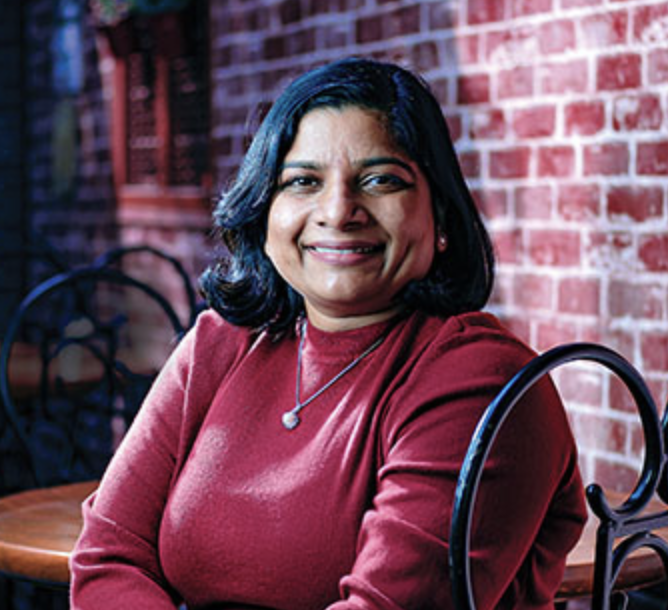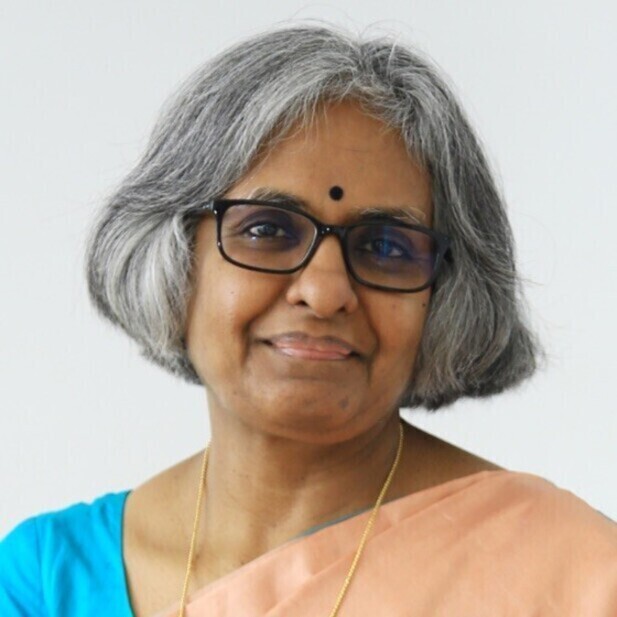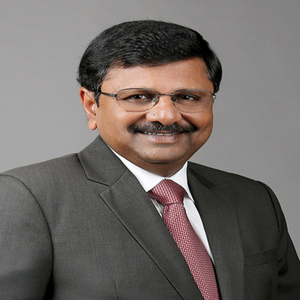In this episode of Nuclei's podcast, we are delighted to host Deena Jacob, a seasoned finance leader with over two decades of expertise in the finance industry. Currently serving as the Co-founder and CFO at Open Financial Technologies, a groundbreaking startup specializing in neobanking solutions tailored for SMEs and startups, Deena brings a wealth of knowledge to the discussion.
Before embarking on her entrepreneurial venture with Open, Deena held key positions such as CFO at Tapzo and Head of Finance at TaxiForSure, showcasing her prowess in financial leadership.
Engaging in a candid conversation with Ankur Joshi, the CEO, and founder of Nuclei, Deena reflects on her formative years in the landscapes of Kerala and delves into her remarkable leadership journey, providing valuable insights into her experiences within the startup ecosystem. She also sheds light on the challenges encountered and overcome during her entrepreneurial pursuit with Open Financial Technologies.
--Transcript Begins--
Ankur Joshi:
Welcome, everyone. I'm Ankur Joshi, the founder of Nuclei, a fintech startup working with banks across Asia. Today, I'm thrilled to have Deena Jacob, a dear friend and an exceptional leader, on this podcast. We've worked together before, and it's fantastic to call her my friend. I'm eager to dive into this conversation and hear her insights, as I've gained a lot from our interactions.
Deena, welcome to the podcast.
Deena Jacob:
Thank you so much, Ankur. It's a pleasure to be here.
Ankur Joshi:
Awesome. So, Deena, let's get into it. Before we hit the record button, we were discussing focusing on your personal journey, the choices that shaped you, and the often overlooked learnings amid visible success. Let's rewind to your childhood. What were the events that shaped your personality during those early years?
Deena Jacob:
Certainly, Ankur. Appreciate your kind words. My childhood in a remote village in Kerala played a significant role in shaping who I am today. Surrounded by greenery, I attended a convent school, benefiting from my parents' academic background—my father, an English literature professor, and my mother, a botany professor.
My father's varied interests and commitment to social causes influenced me deeply. He taught me the importance of taking responsibility, stepping in wherever needed, and solving problems for the greater good. My mother, focusing on discipline, created a balance in my upbringing. These values laid the foundation for my character.
Ankur Joshi:
Fascinating, Deena. Your upbringing in a close-knit family with strong academic influences seems pivotal. Can you share more about the values and lessons you learned during this time?
Deena Jacob:
Absolutely, Ankur. Growing up, I learned the significance of responsibility from my father, engaged in social services and standing up for causes. Our home was a gathering place for diverse people seeking guidance from my father on literature to social issues. My mother, ensuring discipline, balanced my father's encouragement for freedom and independent thinking. These diverse perspectives shaped my approach to life.
Witnessing my father's health struggles—from heart surgeries to paralysis—taught me resilience and the determination to never give up. His commitment to responsibilities despite adversities left a lasting impact. This period taught me the crucial role of strength of mind and determination in facing challenges.
Ankur Joshi:
Your father's resilience and determination in the face of health challenges are truly inspiring. It seems like those experiences had a profound impact on your mindset. How did these early lessons influence your choices as you entered adolescence?
Deena Jacob:
Entering adolescence, I carried forward the values of responsibility and determination. Despite my father's health challenges, he continued as a college principal, setting an example of purpose-driven living. My mother, with her competitive mindset, emphasized setting goals and achieving them. This combination of freedom and discipline, purpose-driven living, and goal-setting shaped my teenage years. Around eighth grade, I decided to explore and experience life to its fullest.
There was a school that I really admired, thinking it was an ICSE school from a different state, and I just wanted to go there to study. It seemed impossible. Everyone was questioning why I wanted to join a state school and what my goals were. The conversation continued about the importance of sticking to the current path, especially in the 10th standard, where staying could lead to becoming a rank holder. Despite the pressure to conform, I was determined to explore beyond my village. I vividly remember the stark differences in the playground and interactions when visiting the nearby town.
My dream of studying in that school took shape, and even though I was already a rank holder in my current school, I insisted on pursuing this dream. My dad's friend, who taught there, helped arrange a meeting with the principal. I had to write a test, and despite facing unfamiliar subjects from their syllabus, I decided to give it a shot.
The principal, considering the possibility of me struggling, asked if I would be okay with repeating the 8th standard if needed. I agreed, fueled by my strong sense of purpose. Starting the 8th standard again was a shock to everyone, but I excelled in every subject. Doubts arose about the wisdom of my choice, questioning what I would do for my 10th standard.
This was my first taste of success or failure. When the 8th standard results were published, the day became the most tense of my life. The fear of not making it to the 9th standard surpassed the anxiety of my 10th standard results.
Fortunately, I got through, marking one of my most significant successes.
My decision to join that school significantly impacted my perspective, exposing me to different aspirations and goals compared to my hometown. The experience was transformative, shaping my future studies. As I progressed to the 11th and 12th grades, my love for science prompted me to pursue it further. However, the pressure to choose between engineering and medicine made me reconsider. I realized my aptitude for neither and ultimately chose a path aligned with my passion for business and mathematics. This led me to the Chartered Accountancy (CA) stream, a decision influenced by my enjoyment of the curriculum and the opportunity to engage with diverse businesses.
During my CA days, an insightful mentor emphasized the importance of giving one's best, regardless of the scale. This perspective stuck with me, reinforcing the idea of leaving a signature in all endeavors. Despite my initial interest in journalism, I found fulfillment in business and economics. The CA curriculum, combined with practical exposure, provided a comprehensive understanding of the corporate world. My practical sessions during auditing, even for small businesses, instilled the notion of delivering excellence in every task.
Upon completion of my CA, I aimed for success in the first attempt, driven by my aversion to repetition due to boredom. By 21, I achieved the milestone and contemplated my next steps. While I had a clearer understanding of my likes and dislikes, I recognized that a career as an auditor might not align with my personality in the long run. Despite joining Deloitte to explore a larger firm's dynamics, I harbored thoughts about my true aspirations and the path my heart desired.
Ankur Joshi:
Before we delve into your time at Deloitte and your history thereafter, right?
A couple of things to focus on. Many times, people only highlight the positive aspects of life, right? Your father went through several health scares, yet his determination to overcome them and continue his work speaks volumes about his personality. Experiencing such challenges at a young age shapes your personality differently.
Having completed your CA at 21, you joined Deloitte. What were your thoughts regarding what you wanted to achieve in life? You're fortunate to have a family that provided opportunities. As a woman leader, talent isn't the only factor; it's also about fairness in opportunities. You've likely faced times when society or people around you were not fair. How do you mentally navigate such situations, building frameworks to overcome challenges?
Deena Jacob:
You're absolutely right. As a child, growing up in a conventional environment, my family played a crucial role. My father emphasized not letting society dictate your ambitions, urging me to believe in myself. He never made me feel limited due to my gender. I remember wanting to ride my brother's cycle, and when he refused, my father bought me one, teaching me independence. These experiences build confidence.
Discrimination based on gender is something women face. My approach is to question societal norms. If criticism arises, consider if it aligns with your values. I always believed in filtering out negativity, trusting in my own thoughts and dreams.
For women, societal expectations impose rules. It's crucial to challenge these norms. I believe in making sense and ensuring no disruption, regardless of gender. If we perpetuate derived problems, it complicates things for society. Trust is earned by breaking away from these stereotypes.
Responsibility took a different turn when I had my daughter. Balancing raising Series B funding while going into labor highlighted the challenges. There's a mental model where responsibility takes over, pushing you to ensure things are in order. Leaders who focus on results, like hustlers, are less impacted by societal norms, making gender less of an issue. It's about reshaping how both society and individuals perceive each other.
In terms of gender equality, it's a collective responsibility. Society needs to embrace change, and individuals on the receiving end should be responsible, creating a balance. Judgment based on responses to situations or reactions shouldn't generalize. Understanding others' experiences is crucial, akin to assessing the NPS, not just for having a great product but also considering how the other side feels.
Ankur Joshi:
Absolutely, you are correct about one thing, the people you surround yourself with shape you. If there are negative influences, it's crucial to eliminate them. Women, in general, are evolutionarily better at nurturing and growing things, more diligent than men. They naturally embrace responsibility, unlike men who often need to learn it. Sadly, as a society, we haven't effectively tapped into the talent of many women who stay at home, resulting in a waste of resources and responsibility-taking abilities.
For instance, we have a team member on maternity break. Despite being advised to stay home, she's dedicated and available. Many great women leaders exist, and it's unfortunate we need to discuss gender-based issues. Men must understand and discard judgmental attitudes. Let's come back to your journey. When you joined Deloitte, did you foresee this interest in business, or did it develop as you grew?
Deena Jacob:
It's an interesting aspect, the discrimination and the empathy managers exhibit, both environmentally and at home. We've established mother's rooms and children's rooms in our offices. Creating a supportive environment is crucial for women returning to work after pregnancy. It's a 360-degree change needed from employers, colleagues, and even support systems at home. My journey has been exploratory; initially, I wasn't sure what I wanted. After Deloitte, I worked in banking during a crucial transition period. I discovered my love for problem-solving, interacting with people, and continuous learning. This realization led me through various roles in banking, startups, and even entrepreneurship.
Ankur Joshi:
Your journey is fascinating. It's clear you've evolved based on your experiences. Has your definition of success changed over these years?
Deena Jacob:
No, my definition of success has remained constant. Changing it would lead to a rat race. It's crucial to stay true to your fundamental values and goals. Competitiveness, happiness, or value-driven approaches may differ among individuals, but staying true to oneself is essential. It's about being self-aware and defining your boundaries in every situation.
Ankur Joshi:
That's profound. Thank you for sharing your insights. Before we conclude, what's the kindest thing anyone has ever done for you?
Deena Jacob:
It's a tough question because people have generally been very kind. Recently, a co-founder sent me a thoughtful note and a gift just to express kindness, without any reason. During my pregnancy, my co-founders displayed extraordinary support, making me feel like part of their family. These acts of kindness, especially when people could react differently, are what I truly appreciate.
Ankur Joshi:
That's beautiful. Thank you for this enriching conversation. I've learned a lot, and I appreciate your time.
Deena Jacob:
Likewise. It was a trip down memory lane. Take care, and thank you.
--Transcript Ends--




